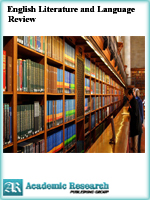English Literature and Language Review
Online ISSN: 2412-1703
Print ISSN: 2413-8827
Print ISSN: 2413-8827
Quarterly Published (4 Issues Per Year)

Archives
Volume 5 Number 2 February 2019
A Study on the Development of Information-based Teaching Ability of Rural Primary English Teachers in Leshan City
Authors: Ye Zhou
Pages: 27-30
DOI: doi.org/10.32861/ellr.52.27.30
Abstract
In the modern society and the information era, information-based teaching ability is a must for primary school English teachers. Thanks to the wide use of information technology in schools, the education system has witnessed big changes in the past few years, which poses new challenges to primary school English teachers. But in western rural areas in China, most primary school English teachers are poorly-trained in terms of information-based teaching. The study takes rural primary school English teachers in Leshan City, Sichuan, China as the research object, taking advantage of approaches like questionnaire survey and interviews, etc. Based on the analysis of the status quo and the influence factors of information-based teaching ability of rural primary school English teachers, the study aims to put forward strategies in order to improve the development of information-based teaching ability of the rural primary school English teachers.
The Use of First Language in Teaching ESP Vocabulary to Engineering Students at a Technical College
Authors: Le Van Tuyen ; Le Bich Van
Pages: 17-26
DOI: doi.org/10.32861/ellr.52.17.26
Abstract
There has been a long-standing debate over the issue of including or excluding the student’s mother tongue (L1) in English as a foreign language (L2) classrooms. There are two opinions in this regard: monolingual approach and bilingual approach. While advocates of monolingual approach suggest that learning is determined by the exposure to L2, those advocating the bilingual approach think that L1 makes a valuable contribution to the learning process. Despite the widespread English-only use in EFL classes, the use of L1 is still a perennial topic. Therefore, this study aims to investigate the use of L1 in English for specific purposes (ESP) classes at a Technical College in Ho Chi Minh City-Vietnam (Henceforth called TC). More specifically, it attempts to explore the extent to which L1 is used and the reasons why L1 is used, and discover what attitudes engineering students have towards the use of L1 in the process of teaching ESP vocabulary to students. The instruments used for collecting data were questionnaires and class observations. The participants were 8 EFL teachers and 314 students at TC. The findings of the study indicated that all the teachers of English overused L1 in teaching ESP vocabulary. The study also revealed that the ESs had supportive attitudes towards their teachers’ use of L1 in teaching ESP vocabulary. Based on the findings, the study provided practical implications in order to help both EFL teachers and engineering students to improve their teaching and learning ESP at vocational training colleges in the Vietnamese context.
For Whom the Bell Tolls in the American Dream?
Authors: Ebru Topkan
Pages: 9-16
DOI: doi.org/10.32861/ellr.52.9.16
Abstract
This paper sheds some light on how the American Dream was galvanized with the discovery of America and how it was evolved into a glimmer of hope for social, sexual, racial, economic and religious equality, democracy, wealth and freedom, which sugars the pills of negative consequences of the American Dream. Considering that dream is something which has not been achieved yet, the American Dream is nothing less than a social criticism of society and a preview of their struggle for the rights that they deserved, and yet they did not have. Although the American Dream was launched innocently and optimistically for a better life, it fell short of expectations in the end. On the contrary, it turns to a nightmare haunting American people with the fear of intolerance of difference, violence, alienation, isolation, ostracism, scapegoating, discrimination, materialism and capitalism. In this paper, the low-down of the American Dream behind its dazzling display will be analysed through two plays: Arthur Miller’s The Crucible and Edward Albee’s The Zoo Story. Ultimately, it will be concluded that the American Dream is a bomb programmed to exterminate itself and only human virtues such as compassion, forgiveness, love, empathy and sacrifice can bring salvation to mankind in the grip of injustice, depression, emotional breakdown, moral decline, and social collapse.



